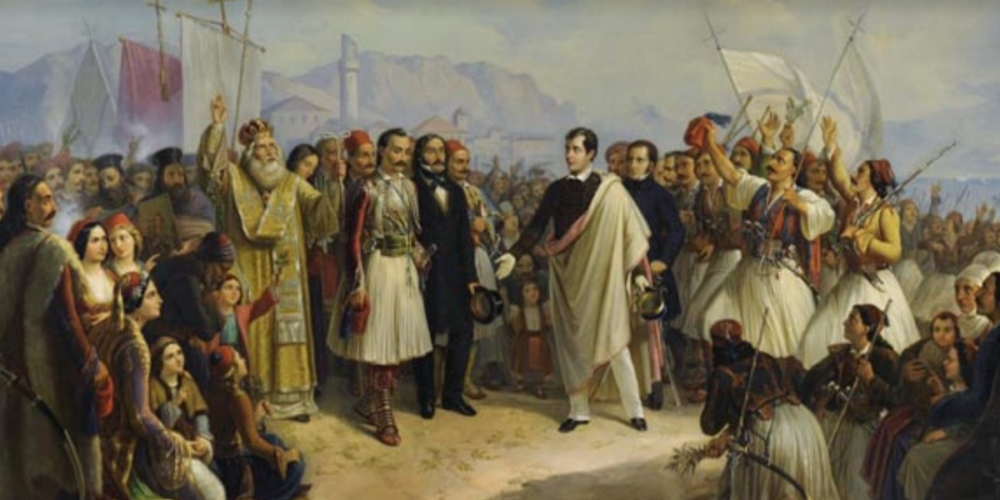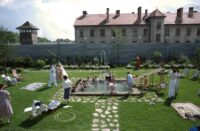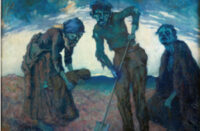George Gordon Lord Byron was born in London on 22 January 1788. In 1794, he inherited the title Baron Byron on the death of his great uncle, and was titled Lord Byron in 1798. He attended Harrow and went on to study at Cambridge in 1805. Here he published his first volume of poetry. After university, he travelled to Spain, Portugal, Greece and Turkey, a journey which he describes in the first two cantos of his early great verse epic “Childe Harold’s Pilgrimage” (1812) and which brought him overnight success.
The scandal around his divorce as well as political disenchantment prompted his exile from England in 1816. Before this, the increasing misery and radicalism of the labourers in the countryside had aroused his anger at the ruling classes. In 1812, when the Frame-Work Bill was being debated in the House of Lords, regarding the death penalty for the destruction of power looms, Byron made his famous maiden speech in defence of the Luddites:
These machines were to them an advantage, inasmuch as they superseded the necessity of employing a number of workmen, who were left in consequence to starve. By the adoption of one species of frame in particular, one man performed the work of many, and the superfluous labourers were thrown out of employment. Yet it is to be observed, that the work thus executed was inferior in quality, not marketable at home, and merely hurried over with a view to exportation.(…) In the foolishness of their hearts, they imagined that the maintenance and well doing of the industrious poor, were objects of greater consequence than the enrichment of a few individuals by any improvement in the implements of trade which threw the workmen out of employment, and rendered the labourer unworthy of his hire.
He warned:
I have been in some of the most oppressed provinces of Turkey; but never, under the most despotic of infidel governments, did I behold such squalid wretchedness as I have seen since my return, in the very heart of a Christian country.
Yet it was only after he had left Britain that Byron became increasingly politicised in the fight against oppression in England as well as on the European mainland. The impression made on Byron by Italian and Greek revolutionaries and his personal experiences of the wars of the suffering and fighting people, led to a new socially critical awareness, which was increasingly reflected in his poetry and motivated him to become personally involved in the Greek freedom struggle and died at the age of thirty-six.
The reception of Byron’s work by the establishment tends to focus on personal aspects, often reducing his life and poetry to women, sex, “unnaturalness” and money, disregarding his political ideas. So how are his political convictions are expressed in his work?
Byron’s first great success, the first two cantos of “Childe Harold”, initially reflected the prevailing European mood of world-weariness, of powerlessness in a hostile world. Other poems published in 1812 express a clearer political stance, for example “An Ode to the Framers of the Frame Bill”, in which Byron expressed sympathy for the weavers, albeit still believing in the parliamentary system.
However, in the later cantos of “Childe Harold”, written in exile, this loneliness turns into a growing awareness of the alienation of the capitalist world. The aristocratic outlaw, Byron’s lonely, proud hero, takes a stand against oppression.
Byron’s collaboration with Shelley in exile in Italy and his experience of the liberation movement in Italy and Greece led to a better understanding of society and the revolutionary struggle of the people. In these countries struggling for national independence, including also Poland, the Byronic hero was often seen as representing their quest for freedom.
The final victory of the allied powers in 1815 led to a Holy Alliance under the rule of Catholic Austria, Orthodox Russia and Protestant Prussia. Dissent, non-Christian religions and natural religion were equally condemned. The reactionary forces persecuted anything that smelled of French “freethought”.
In “Don Juan”, Byron postulates that poetry can replace Christianity as a way of understanding the world. This was understood as blasphemy of colossal proportions. Christianity is eliminated and art is given central importance. Paganism, sensuality, and the this-worldliness inherent in ancient mythology became part of this radical challenge of the existing Holy Alliance.
Arising from his own experience of the national liberation movement in Italy, Byron’s point of view matures in “Marino Faliero” (1820). The Doge Marino Faliero joins the people in their struggle. From the outsider position of “Manfred”, Byron now moves in a direction in which the alliance is conceived as a struggle against his own class; the strength of the movement lies in the alliance.
The Rebel Bertuccio comes from the people and embodies their strengths. He fights selflessly for the freedom of Venice and its people. Byron has come to recognise that the leaders of such a liberation movement can, perhaps even must, come from the people. It is Faliero who joins the people, recognises their leadership role, and not the other way round.
In January 1824, Byron travelled to Greece, where he planned to take part in the struggle for liberation from the Ottoman Empire. He died of a “fever” in Missolonghi on 19 April before this could happen. Nevertheless, he became a national hero in Greece, which he still is to this day. His name – pronounced Veeron in Greek – is a popular name for boys; even an entire district of Athens (Vyronas, Βύρωνας, older: Vyron Βύρων) is named after him.






